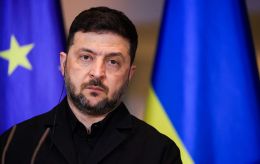Latvian Foreign Minister on Ukraine's accession to EU: 'We will be able to officially open negotiations in December'
 Latvian Foreign Minister Krisjanis Karin (Photo: Getty Images)
Latvian Foreign Minister Krisjanis Karin (Photo: Getty Images)
The EU leaders' summit scheduled for December 14-15 may adopt a decision to start negotiations on Ukraine's accession. This is a complex process, even in peacetime, stated Latvian Foreign Minister Krisjanis Karins in an interview with RBC-Ukraine.
"Regarding European integration, I sincerely hope that we, the European Union, will be able to accept the European Commission's proposal to officially open negotiations in December. I think it's extremely important symbolically and practically," the Latvian Foreign Minister shared his thoughts.
However, he noted that negotiations are challenging even in the absence of war.
"And your country is undertaking reforms during a war, something no one has ever had to do. The fact that you are willing to do it already speaks to the determination of your country. I am very convinced, and we will prove this at the December summit, about saying "yes" (to the decision to open negotiations with Ukraine, - ed.)," said the Minister.
Negotiations on Ukraine's accession to the EU
On November 8, the European Commission recommended that the EU Council begin negotiations with Ukraine on accession. According to Ursula von der Leyen, Ukraine has already implemented 90% of the reforms expected by the EU. However, Kyiv must continue reforms to proceed further.
To open negotiations, unanimous approval from all EU leaders is required. However, Hungary currently opposes this decision.
Attitudes of Ukrainians toward accession
According to a survey by the Sociological Group "Rating," an overwhelming majority of Ukrainians in all regions support the country's accession to the European Union. As of the end of November, 78% of respondents would vote for Ukraine's accession to the EU in a potential referendum, slightly down from 85% in July of the same year. Only 5% of respondents are against EU accession, while 3% remain undecided, and 14% would not vote.
According to another survey by KIIS, the two main motivations for Ukraine's accession to the EU are ensuring long-term security (59%) and economic prospects (57%).

